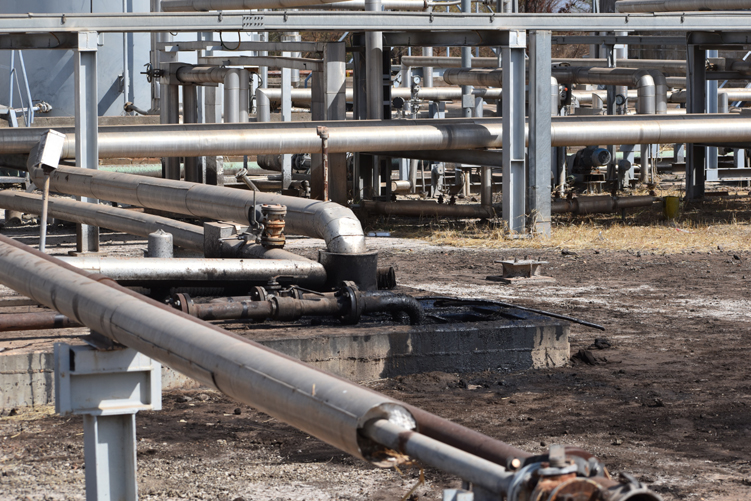As the South Sudanese oil industry begins to recover from the impact of civil conflict, the government has pledged to promote transparency and accountability in the industry. The country’s oil was previously sold via pre-financing deals with a narrow range of customers, mainly in China. This provided some certainty but meant that crude was sold at a discount of about 10%. President Salva Kiir Mayardit ordered a review of the practice last year and it has now been replaced with oil sold on the open market via an open tender system.
Pipes at the Unity Oil Field (Image source: South Sudan Ministry of Petroleum)
This will create more transparency, generate more income and create more competition for South Sudanese oil. The tender approach to selling will allow for open bidding, with clearly established criteria to evaluate competing bids for the crude oil. Bids will be assessed according to price, financial security and the government’s desire to spread exposure across multiple bidders, while early payment will be considered to meet government operational needs.
All government oil revenues are remitted to the Ministry of Finance account at the Central Bank as laid down in the 2012 Petroleum Management Act. Hon. Eng. Awow Daniel Chuang, Undersecretary at the Ministry of Petroleum, commented: “We are trying to increase transparency in the country’s oil and gas sector, specifically concerning the financial aspects”, he said.
In February, the Ministry of Petroleum released its Marketing Petroleum Report for 2019, which provides details of its transparency plans, marketing strategy and expected upstream development. The annual report will include details of all oil sales. The Ministry also provides periodic press releases that outline recent sales and production volumes, crude oil revenues, tariff and assistance fee payments to Sudan, plus other relevant marketing data.
The report states: “Transparency in marketing is the cornerstone to growing a new international customer base mandated to conform to the highest ethical standards, as well as to ensure oil revenue cash flows are conducted through proper channels.” The government has pledged to implement the Extractive Industries Transparency Initiative (EITI), although capacity constraints at the Ministry of Petroleum mean that more needs to be done on effective implementation.
Environmental transparency
The government has also pledged to provide more information on the environmental impact of the oil industry and measures to mitigate it. Juba concedes that oil industry operations have caused soil and water pollution, the loss of grazing land and localised health problems. Much of the pollution occurred prior to independence in 2012 but civil conflict since then has made it difficult to rectify the harm caused. President Salva Kiir said that the damage “needs to be checked through the formulation of environmental policies, standards and guidelines, and enforcement of these instruments”.
A call of interest was launched in January for a contract to undertake a comprehensive environmental audit. Juba wants existing pollution cleaned up and measures put in place to deal with future damage. The conclusions of the audit will be used to inform a proposed action plan to develop ways to reduce and/or mitigate environmental problems in oil-producing areas.
KeyFacts Energy Industry Directory: AZ Media PR
 KEYFACT Energy
KEYFACT Energy
